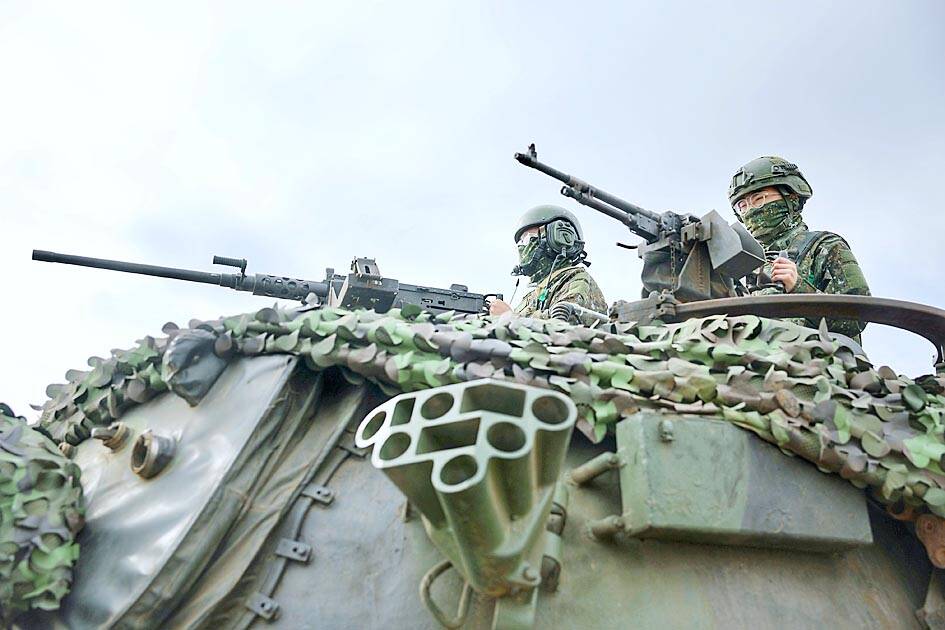There is a “moderate” likelihood of a cross-strait war this year that could have a “high” impact on US interests, a survey by the New York-based Council on Foreign Relations said on Tuesday.
“Intensified military and economic pressure by China toward Taiwan” is listed among other “top conflicts to watch in 2025” as a “Tier I (High Priority)” potential war, the think tank’s Center for Preventative Action (CPA) said in a report.
China’s hostile actions toward Taiwan could “precipitate a severe cross-strait crisis involving the United States and other countries in the region,” the report said, adding that such a scenario could “suddenly ignite.”

Photo: CNA
The report, titled “Preventive Priorities Survey 2025,” is based on 680 responses from foreign policy experts collected in November last year. It “evaluates ongoing and potential conflicts based on their likelihood of occurring in the coming year and their expected impact on US interests.”
A potential armed conflict between Taiwan and China has been listed as a “moderate likelihood” and “high impact” Tier I contingency every year since 2020 in the CPA’s annual report.
Other moderate-likelihood and high-impact conflict scenarios listed alongside a possible cross-strait war in this year’s report are cyberattacks on US critical infrastructure, “aggressive Chinese actions” in the South China Sea, and “domestic terrorism and political violence” in the US.
The highest-risk potential conflict scenarios — those listed as of high likelihood and high impact — in the survey included “a continuation of the Israel-Hamas war” and “increased conflict between Israeli security forces and Palestinians in the West Bank.”
They also include “major Russian military gains in Ukraine,” “an escalation of the conflict between Iran and Israel” and heightened “tensions with Mexico.”
A humanitarian crisis in Haiti, “accelerated state collapse” in Lebanon, and “increased Russian military provocations and influence operations in eastern Europe” are listed as high-likelihood and moderate-impact potential conflict scenarios.
The Council on Foreign Relations “generates policy-relevant ideas and analysis, convenes experts and policymakers, and promotes informed public discussion,” the report said.

TRAGEDY STRIKES TAIPEI: The suspect died after falling off a building after he threw smoke grenades into Taipei Main Station and went on a killing spree in Zhongshan A 27-year-old suspect allegedly threw smoke grenades in Taipei Main Station and then proceeded to Zhongshan MRT Station in a random killing spree that resulted in the death of the suspect and two other civilians, and seven injured, including one in critical condition, as of press time last night. The suspect, identified as a man surnamed Chang Wen (張文), allegedly began the attack at Taipei Main Station, the Taipei Fire Department said, adding that it received a report at 5:24pm that smoke grenades had been thrown in the station. One man in his 50s was rushed to hospital after a cardiac arrest

SAFETY FIRST: Double the number of police were deployed at the Taipei Marathon, while other cities released plans to bolster public event safety Authorities across Taiwan have stepped up security measures ahead of Christmas and New Year events, following a knife and smoke bomb attack in Taipei on Friday that left four people dead and 11 injured. In a bid to prevent potential copycat incidents, police deployments have been expanded for large gatherings, transport hubs, and other crowded public spaces, according to official statements from police and city authorities. Taipei Mayor Chiang Wan-an (蔣萬安) said the city has “comprehensively raised security readiness” in crowded areas, increased police deployments with armed officers, and intensified patrols during weekends and nighttime hours. For large-scale events, security checkpoints and explosives

PUBLIC SAFETY: The premier said that security would be tightened in transport hubs, while President Lai commended the public for their bravery The government is to deploy more police, including rapid response units, in crowded public areas to ensure a swift response to any threats, President William Lai (賴清德) said yesterday after a knife attack killed three people and injured 11 in Taipei the previous day. Lai made the remarks following a briefing by the National Police Agency on the progress of the investigation, saying that the attack underscored the importance of cooperation in public security between the central and local governments. The attack unfolded in the early evening on Friday around Taipei Main Station’s M7 exit and later near the Taipei MRT’s Zhongshan

ON ALERT: Taiwan’s partners would issue warnings if China attempted to use Interpol to target Taiwanese, and the global body has mechanisms to prevent it, an official said China has stationed two to four people specializing in Taiwan affairs at its embassies in several democratic countries to monitor and harass Taiwanese, actions that the host nations would not tolerate, National Security Bureau (NSB) Director-General Tsai Ming-yen (蔡明彥) said yesterday. Tsai made the comments at a meeting of the legislature’s Foreign Affairs and National Defense Committee, which asked him and Minister of National Defense Wellington Koo (顧立雄) to report on potential conflicts in the Taiwan Strait and military preparedness. Democratic Progressive Party (DPP) Legislator Michelle Lin (林楚茵) expressed concern that Beijing has posted personnel from China’s Taiwan Affairs Office to its